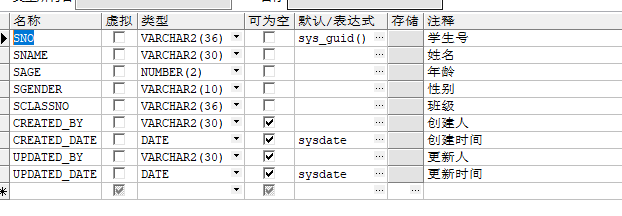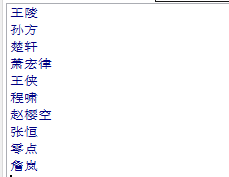Oracle之数组
记忆力不好,提供样例套路:
固定长度数组:
declare type t_test is varray(5) of varchar2(9); test t_test := t_test('a', 'b', 'c', 'd', 'e'); begin --遍历 for i in 1 .. test.count loop dbms_output.put_line(test(i)); end loop; end;
可变长度数组:
declare type t_test is table of varchar2(9); test t_test := t_test('a', 'b', 'c', 'd', 'e'); begin --遍历 for i in 1 .. test.count loop dbms_output.put_line(test(i)); end loop; end;
自定义结果集:
如当前有表,表结构如图:

declare type stu_record is record( v_sname l_student_info_tbl.sname%type, v_sage l_student_info_tbl.sage%type, v_sgender l_student_info_tbl.sgender%type, v_sclassno l_student_info_tbl.sclassno%type); TYPE stu_rec IS TABLE OF stu_record INDEX BY BINARY_INTEGER; v_stu_rec stu_rec; begin select t.sname, t.sage, t.sgender, t.sclassno bulk collect into v_stu_rec from l_student_info_tbl t; for i in 1 .. v_stu_rec.count loop dbms_output.put_line(v_stu_rec(i).v_sname); end loop; end;
结果:注意:bulk collect 可以在select into ,fetch into ,returning into ,需要大量内存,但比游标高效。

%rowtype表示一行记录的变量,比分别使用%TYPE来定义表示表中各个列的变量要简洁得多,并且不容易遗漏、出错。这样会增加程序的可维护性。
declare TYPE t_user IS TABLE OF l_student_info_tbl%ROWTYPE INDEX BY BINARY_INTEGER; v_arry_user t_user; begin select t.* bulk collect into v_arry_user from l_student_info_tbl t; for i in 1 .. v_arry_user.count loop dbms_output.put_line(v_arry_user(i).sname); end loop; end;
有时批处理,用rowid处理更快高效。
declare type t_rowid is table of rowid index by pls_integer; v_rowid t_rowid; begin select rowid bulk collect into v_rowid from l_student_info_tbl t where rownum <= 2; for i in 1 .. v_rowid.count loop dbms_output.put_line(v_rowid(i)); end loop;
forall i in 1.. v_rowid.last
--dml语句(insert update delete)
end;





